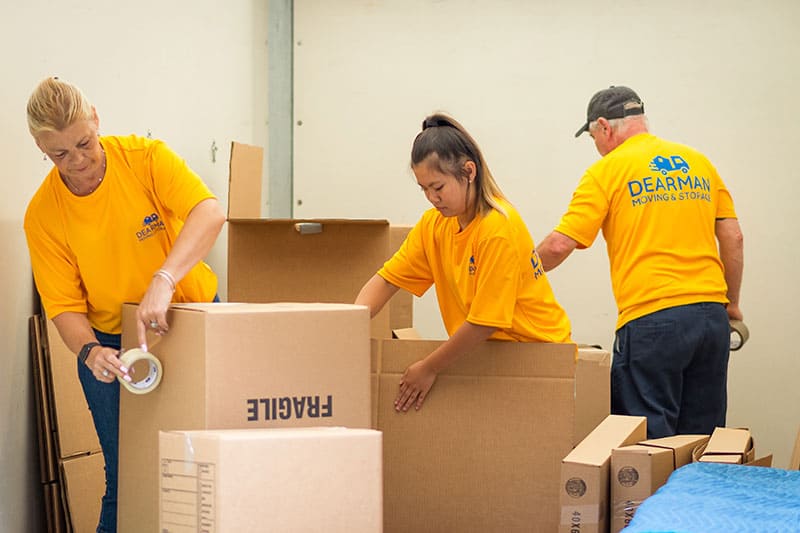Recognizing the Inclusions of moving and Freight Forwarding on the planet of Worldwide and domestic Shipping
Guiding via the complexities of moving and Freight forwarding can be difficult. Both processes entail distinctive treatments and needs that are crucial for effective transport. Recognizing the distinctions in logistics, documents, and threat monitoring is necessary for individuals and organizations alike. This understanding can considerably affect the efficiency and safety and security of shipments. Nevertheless, lots of are unaware of the certain elements that affect the overall experience and outcomes. What variables should one consider to assure a smooth changeover?
The Fundamentals of moving and Freight Forwarding
moving and Freight forwarding are essential parts of the worldwide logistics sector. They facilitate the transfer of goods and personal belongings throughout domestic and international boundaries. moving primarily involves the relocation of households or individuals, encompassing property and business demands. It commonly consists of packaging, packing, delivering, and unloading items at the destination. On the other hand, Freight forwarding is concentrated on the delivery of items, usually in mass, utilizing numerous transport settings, such as air, land.freight, or sea forwarders work as middlemans, working with logistics to ensure timely distribution while maneuvering with complex policies and personalizeds procedures. Both procedures need careful planning, company, and interaction to ensure effectiveness and reduce disruptions. Comprehending these principles is vital for any person associated with logistics, as they prepared for more advanced facets of delivery and transportation monitoring.
Trick Elements of Freight Forwarding Solutions
Freight forwarding solutions include numerous essential parts that assure smooth transport of goods. Key responsibilities of Freight forwarders include managing logistics, working with deliveries, and taking care of customizeds clearance. Furthermore, comprehending essential delivery paperwork is necessary for conformity and efficient motion of freight.
Freight Forwarder Responsibilities
A trusted Freight forwarder plays an important duty in collaborating the transportation of goods, guaranteeing that deliveries are managed effectively and in conformity with regulations. Their duties incorporate various essential jobs, including picking suitable transport routes, negotiating Freight prices, and managing logistics. They function as intermediaries between carriers and providers, making certain that freight is correctly packaged and classified for risk-free transportation. Furthermore, Freight forwarders track shipments, offering updates to customers concerning the condition and anticipated distribution times. They also examine and manage threats related to transport, advising insurance options as needed. By helping with communication and paperwork, Freight forwarders enhance the delivery process, minimizing prospective delays and boosting general supply chain efficiency.
Shipping Paperwork Essentials

Recognizing Customs Clearance and Documentation
Exact paperwork is essential in the personalizeds clearance procedure, as it ensures conformity with various laws. An introduction of custom-mades guidelines highlights the complexities encountered by carriers and Freight forwarders. Typical clearance difficulties can substantially influence delivery timelines and costs, making understanding this facet important for efficient logistics.
Importance of Accurate Documentation
Steering with the complexities of worldwide shipping calls for a keen understanding of custom-mades clearance and the vital duty of documents. Exact documentation is crucial for making certain that shipments abide with guidelines and reach their destinations right away. Effectively prepared papers, consisting of bills of lading, industrial billings, and packing checklists, promote smooth interactions with custom-mades authorities. Inaccuracies can bring about delivery delays, fines, and even confiscation of products. Complete documentation help in tracking deliveries and settling conflicts. Businesses involved in moving and Freight forwarding must focus on meticulous documents practices to navigate the complex landscape of global shipping successfully. This diligence not only simplifies operations however also enhances client satisfaction by guaranteeing prompt shipment.
Custom-mades Laws Review
Steering custom-mades laws is an essential facet of international trade that directly influences the success of moving and Freight forwarding operations. Efficient personalizeds clearance calls for an understanding of different regulations, including tolls, responsibilities, and import/export limitations. Accurate paperwork is crucial, as it assures conformity with lawful demands and helps with the efficient movement of items across boundaries. Trick records commonly include business billings, packaging lists, and expenses of lading, which supply detailed details concerning the delivery. Furthermore, customs brokers play a vital duty in steering complicated regulations, acting as middlemans in between shippers click here now and custom-mades authorities. By keeping extensive understanding of custom-mades processes, services can considerably reduce delays and minimize costs related to worldwide shipping.
Common Clearance Challenges
Numerous obstacles can emerge during the customs clearance procedure, frequently making complex the activity of items across boundaries. One substantial concern wants documents, which can lead to hold-ups and penalties. Importers and merchants must ensure all called for documentation, such as billings, packaging checklists, and certificates of beginning, is accurate and full. In addition, inconsistencies in evaluation can cause examination from customs authorities, leading to extra tasks or examinations. Language barriers may also position challenges, as miscommunication can bring about misconceptions concerning policies. Adjustments in customs policies can develop complication, necessitating consistent watchfulness by carriers. Eventually, getting over these clearance challenges needs extensive preparation and a clear understanding of customizeds requirements to promote smooth worldwide deals.
Product Packaging and Labeling Requirements
Often overlooked, packaging and labeling requirements play a vital duty in the shipping procedure, guaranteeing that goods are shielded and conveniently identifiable throughout their trip (international shipping). Appropriate product packaging safeguards products from damage during transportation, while also assisting in efficient handling and storage space. Utilizing ideal products, such as bubble wrap, foam, or sturdy boxes, can prevent breakage and loss.Labeling is similarly critical. Clear and precise tags convey crucial information, consisting of the location, managing directions, and materials. Labels must abide by regulations specific to worldwide and residential shipping, which may consist of harmful materials recognition or personalizeds declarations.Moreover, standardized labeling practices streamline the monitoring procedure and improve overall logistics effectiveness. By sticking to product packaging and labeling demands, businesses lessen the risk of hold-ups, damages, or misdelivery. Eventually, these methods add greatly to the success of moving and Freight forwarding procedures, making certain a smooth shipping experience for all parties included
Tracking Shipments: Importance and Techniques
Effective product packaging and labeling set the foundation for effective delivery administration, but tracking shipments is just as essential in the delivery process. Delivery monitoring gives real-time visibility, which assists customers and organizations check the progress of their items. This openness enhances client complete satisfaction, since clients can stay notified concerning shipment timelines and any prospective delays.Several methods promote efficient monitoring. Barcode scanning is an usual approach, using unique identifiers to keep track of plans throughout their trip. Furthermore, GPS modern technology allows exact area tracking, enabling timely updates and enhanced logistics monitoring. Lots of shipping firms currently provide digital systems and mobile applications that offer users with very easy accessibility to tracking information.The significance of shipment tracking can not be overemphasized; it reduces the risk of shed or damaged items, improves operational performance, and cultivates trust in between carriers and receivers. Integrating efficient monitoring methods is crucial for effective domestic and worldwide delivery operations.
Insurance policy Options for Your Goods
Safeguarding insurance for goods en route is an important consideration for individuals and companies alike. Insurance policy alternatives vary based on the sort of shipment, worth of products, and particular risks entailed. Typical kinds include provider responsibility, which covers loss or damages while in transit, and full-value insurance coverage, giving comprehensive protection for the complete value of the goods.Shippers may additionally take into consideration aquatic insurance for international shipments, protecting versus threats connected with sea transport. It is vital to analyze the specific needs of the delivery and assess the terms of any policy.Furthermore, understanding exemptions and restrictions is essential to prevent prospective spaces in coverage. Shippers need to involve with insurance specialists to check out tailored services that fit their distinct situations. Inevitably, spending in the ideal insurance coverage can alleviate monetary dangers and offer peace of mind throughout the shipping process.
Selecting the Right moving and Freight Forwarding Service
When picking a moving and Freight forwarding service, it is essential for people and services to meticulously examine their particular needs and top priorities. Elements such as the quantity of products, destination, and timeline play a considerable role in this decision-making procedure. Investigating numerous companies is a good idea; comparing their solutions, pricing, and consumer evaluations can disclose useful insights.Additionally, it is necessary to take into consideration the experience and know-how of the service company in handling certain sorts of freight, especially for worldwide deliveries that may entail custom-mades clearance. Openness in pricing, consisting of any concealed costs, ought to also be scrutinized.Furthermore, examining the degree of consumer assistance offered is vital, as prompt communication can alleviate concerns during transit (international shipping). Confirming the accessibility of insurance coverage choices assures that goods are shielded throughout the delivery process. By taking these services, individuals and actions can make enlightened selections that straighten with their logistics requirements
Frequently Asked Inquiries
What Kinds Of Goods Can Be Shipped Internationally?

Exactly How Do Delivery Expenses Differ Between Various Providers?
Delivering costs differ significantly between carriers because of aspects such as service rate, cargo kind, distance, and extra solutions provided. Each service provider's pricing design reflects these variables, influencing general delivery costs for customers.
Can I Ship Hazardous Products or Perishables?
Delivering unsafe products and perishables undergoes strict guidelines. Service providers typically require certain product packaging, labeling, and paperwork. Shippers need to assure conformity with global and neighborhood regulations to avoid charges and ensure secure transportation.
What Should I Do if My Shipment Is Postponed?
When encountered with a shipment hold-up, one must first call the service provider for updates. After that, review any notifications got, examine different remedies, and maintain all events notified concerning the scenario to minimize disruptions.
Are There Weight Limits for Delivery Containers?
Weight restrictions for shipping containers differ relying on elements like container dimension and shipping regulations. Usually, typical containers have a maximum gross weight of around 30,000 to 32,000 kgs to ensure safe transportation and handling. In contrast, Freight forwarding is focused on the delivery of products, commonly in bulk, using numerous transport modes, such you could try this out as land.freight, air, or sea forwarders act as intermediaries, working with logistics to ensure timely distribution while navigating through facility guidelines and customizeds treatments. Secret responsibilities of you can try these out Freight forwarders consist of managing logistics, collaborating shipments, and managing customizeds clearance. A dependable Freight forwarder plays an essential duty in collaborating the transport of products, ensuring that deliveries are managed efficiently and in conformity with regulations. Efficient product packaging and labeling set the structure for successful delivery administration, yet tracking shipments is similarly vital in the delivery process. Several shipping business now provide electronic systems and mobile applications that provide users with simple accessibility to tracking information.The significance of delivery monitoring can not be overstated; it reduces the danger of shed or damaged products, boosts functional performance, and fosters count on in between receivers and shippers.